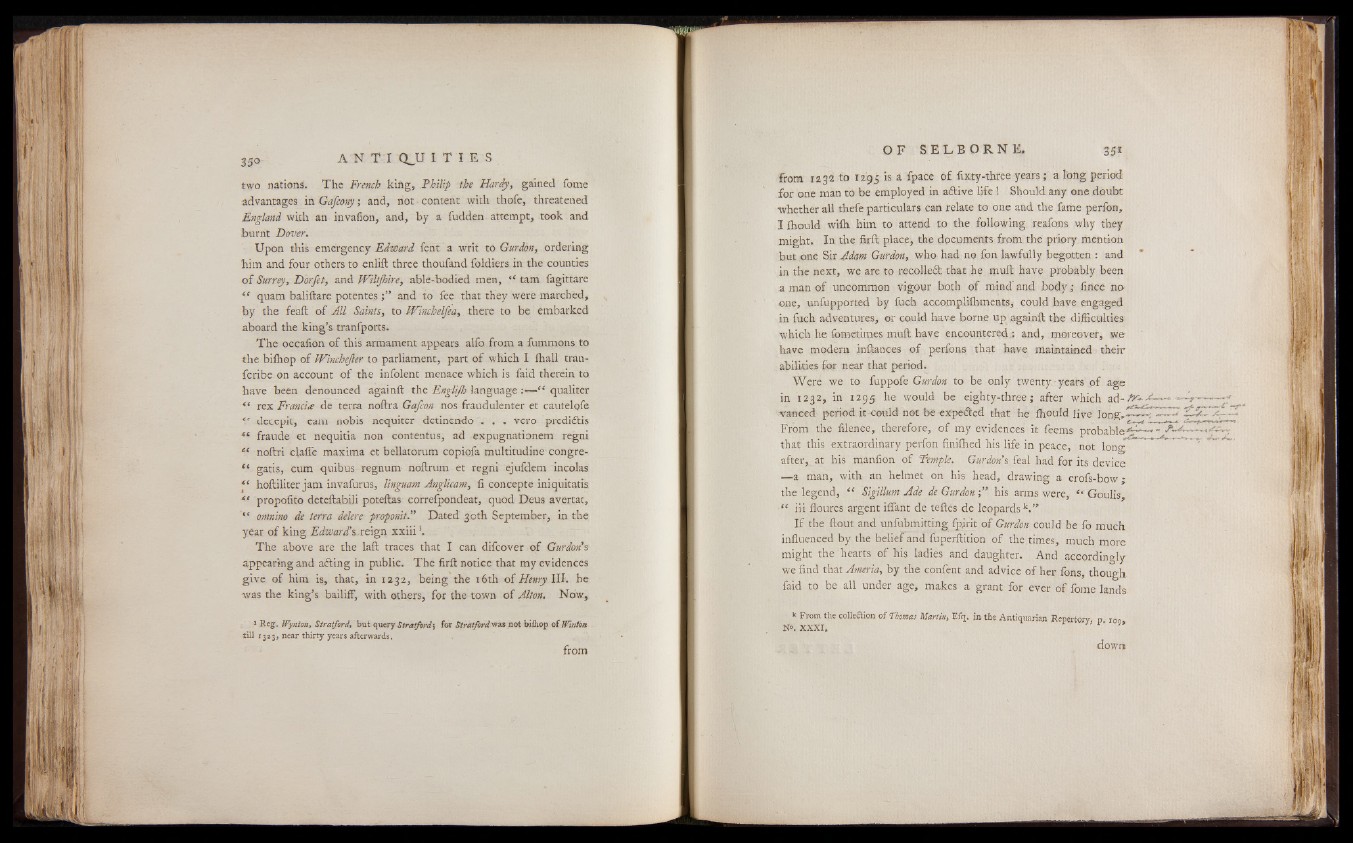
35° A N T I QJI I T I E S
two nations. The French king, Philip the Hardy, gained fome
advantages in Gafcony; and, not content with thofe, threatened
England with an invafion, and, by a fudden attempt, took and
burnt Dover.
Upon this emergency EdvOard fent a writ to Gurdon, ordering
him and four others to enlift three thoufand foldiers in the counties
o f Surrty, Dorfet, and Wiltjhire, able-bodied men, “ tam fagittare
“ quam baliftare potentes and to fee that they were marched,
by the feaft of All Saints, to IVinchelfea, there to be embarked
aboard the king’s tranfports.
The occafion of this armament appears alfo from a fummons to
the bifhop of Winchejler to parliament, part of which I fhall tran-
fcribe on account of the infolent menace which is faid therein to
have been denounced againft the Englijh language :— “ qualiter
“ rex Francia de terra noftra Gafcon nos fraudulenter et cautelofe
“ decepit, earn nobis nequiter detinendo . . . vero prediftis
“ fraude et nequitia non contentus, ad expugnationem regni
“ noftri clafle maxima et bellatorum copiofa multitudine congre-
“ gatis, cum quibus regnum noftrum et regni ejufdem incolas
“ hoftiliter jam invafurus, linguam Anglicam, li concepte iniquitatis
■M propofito deteftabili poteftas correfpondeat, quod Deus avertat,
“ omnino de terra delere proponit.” Dated 30th September, in the
year of king Edward’s.re\gn x x iii'.
The above are the laft traces that I can difcover of Gurdotds
appearing and adting in public. The fir ft notice that my evidences
give of him is, that, in 1232, being the 16th of Henry III. he
was the king’s bailiff, with others, for the town of Alton. Now,
1 Reg. Wynton, Stratford, but query Stratford j for Stratford was not bilhop of Winton
till 1323, near thirty years afterwards.
from
i l l
from 1232 to 1295 is a fpacc of fixty-three years ; a long period
for one man to be employed in aftive life ! Should any one doubt
whether all thefe particulars can relate to one and the fame perfon,
I Ihould wilh him to attend to the following reafons why they
might. In the firffc place, the documents from the priory mention
but one Sir Adam Gurdon, who had no fon lawfully begotten : and
in the next, we are to recoiled that he muft have probably been
a man of uncommon vigour both of mind and body; iince no
one, unsupported by fuch accomplilhments, could have engaged
in fuch adventures, or could have borne up againft the difficulties
which he fbmetimes muft have encountered,: and, moreover, we
have modern inftances of perfcns that have maintained their
abilities for near that period.
Were we to fuppofe Gurdon to be only twenty.'years of age
in 1232, in 1295 he would be eighty-three; after which ad
vanced period it could not be expeded that he Ihould live long.^^7
From the filenee, therefore, of my evidences it feems probable-*1--'—• -
that this extraordinary perfon finilhed his life in peace, not long
after, at his manfion of Sfemple. Gurdon’s feal had for its device
— a man, with an helmet on his head, drawing a crofs-bow;
the legend, <c Sigillum Ade de G u r d o n his arms were, “ Goulis,
“ iii floures argent iffant de teftes de leopards V *
If the flout and unfubmitting lpirit of Gurdon could be fo much
influenced by the belief and fuperftition of the , times, much more
might the hearts of his ladies and daughter. And accordingly
we find that Ameria, by the confent and advice of her Tons, though
faid to be all under age, makes a grant for ever of fome lands
k From the coMion of 'Thomas Martin, E% in the Antiquarian Repertory, p 100
N». XXXI.
down
• nf-tr
Ini
'JjfVjjjj
I I
1
i f
l i f l
BH